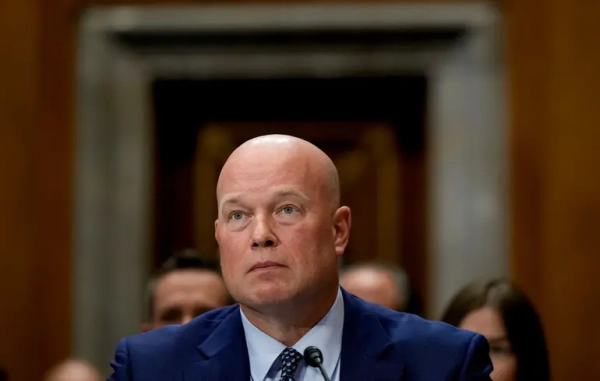Jordan got the GOP nomination. But he’s a long way from the support he needs on the House floor.

Rep. Jim Jordan (R-OH) speaks to reporters as House Republicans hold a caucus meeting at the Longworth House Office Building on October 13, 2023 in Washington, DC. Win McNamee/Getty Images Andrew Prokop is a senior politics correspondent at Vox, covering the White House, elections, and political scandals and investigations. He’s worked at Vox since the site’s launch in 2014, and before that, he worked as a research assistant at the New Yorker’s Washington, DC, bureau.
If at first you don’t succeed, get the guy who succeeded to quit, and then try again.
That’s how Rep. Jim Jordan (R-OH) won a vote among House Republicans to be the party’s newest nominee for speaker of the House Friday.
But that’s only step one. To become speaker, Jordan will need to win a majority on the floor of the House of Representatives. Since Democrats are certain to unanimously oppose him, that means he’d need 217 of 221 Republicans to clinch the job, if everyone is in attendance.
And he’s still a long, long way from that. After winning the GOP nomination, Jordan asked for another vote among House Republicans about whether they’d support his speaker election on the floor. Only 152 said they would.
If the holdouts are serious, the GOP has no clear path forward.
Jordan is now facing the same problem Rep. Steve Scalise (R-LA), who narrowly defeated Jordan in the party’s initial speaker nominee vote two days prior, faced. On Thursday night, Scalise threw in the towel, evidently concluding he could not unite the party.
Jordan then eagerly jumped back into the race. In Friday’s vote, he beat back a late challenge from Rep. Austin Scott (R-GA), a little-known lawmaker, 124 to 81 — a margin only slightly better than Scalise’s. But that triumph was undercut by the vote shortly afterward that made clear how far he still had to go.
Still, if Jordan tries to fight it out, the dynamic will be different. He’ll have hardliners on the right — who’ve previously caused trouble on the floor votes — solidly behind him. Holdouts will also face pressure from right-wing media outlets and likely President Trump.
Jordan has long been a leader in the hardline faction of the GOP conference — former speaker John Boehner once called him a “legislative terrorist.” Yet in recent years he’s appeared to be a team player working with leadership; for instance, he backed McCarthy’s debt ceiling deal this year.
But there is resentment among some in the GOP conference about the tactics Jordan and his backers have used to climb to the top. Others may be concerned that Jordan’s leadership would be too extreme.
Currently, Republicans plan to put Jordan’s nomination on the floor on Tuesday. So the next few days will determine whether there are enough “Never Jordan” Republicans to block him — or whether his critics will cave and vote him in.
How we got from McCarthy to Scalise to Jordan
After McCarthy’s deposal as speaker, Jordan and Scalise soon emerged as the two leading candidates to replace him. And in the party’s first attempt at picking a speaker nominee, on Wednesday, Scalise narrowly defeated Jordan in a 113 to 99 internal party vote.
Reports at the time were that Jordan conceded and pledged to endorse Scalise afterward. Now, however, sources have told Politico that he was not so conciliatory. According to Rep. Ann Wagner (R-MO), who wasn’t in the room but says she was told what happened, Jordan told Scalise: “You get one ballot. And when you go down, you will nominate me.” Then, when Scalise protested, Jordan said, “America wants me” and walked out.
Scalise would not even make it to that first ballot on the House floor. From Wednesday afternoon to Thursday, 19 Republicans, mostly hardliners on the right and Jordan allies, said they would not support Scalise’s nomination on the floor. So on Thursday night, Scalise threw in the towel and quit the race.
Jordan then made it official that he’d try again, and as Republicans prepared for another internal speaker vote Friday, he was the only declared candidate.
But shortly after noon, Scott announced he was throwing his name in the ring. The little-known lawmaker didn’t really come off as a serious contender — he openly said “I don’t necessarily want to be the speaker of the House” — but he provided an alternative that the anti-Jordan contingent could back.
Then, before the GOP even voted, allies of two other members — Majority Whip Tom Emmer (R-MN) and Rep. Mike Johnson (R-LA) — told reporters that, if Jordan just so happened to fail to get 217 votes on the floor, they’d be interested in being considered. You know, just in case.
Jordan ended up with 124 votes on the secret ballot GOP vote — not an incredibly impressive showing against his little-known challenger. Then just 152 Republicans said they’d support him on the floor — meaning he needs 65 more.
It’s a tall order. What Jordan may have going for him is that members who distrust him likely also hate the chaos of a closed House, fear defying Trump, and fear making a deal with Democrats even more. Considering all that, and the pressure they’ll face in the days ahead, it’s possible enough Republicans will conclude Speaker Jordan is the least bad option.
Sourse: vox.com






